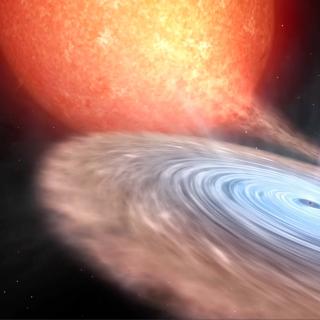Bibcode
González Hernández, J. I.; Casares, J.
Referencia bibliográfica
Astronomy and Astrophysics, Volume 516, id.A58
Fecha de publicación:
6
2010
Revista
Número de citas
33
Número de citas referidas
31
Descripción
Context. Doppler tomography of emission line profiles in low-mass X-ray
binaries allows us to disentangle the different emission sites and study
the structure and variability of accretion disks. Aims: We
present UVES high-resolution spectroscopic observations of the black
hole binary A0620-00 at quiescence. Methods: These spectroscopic
data constrain the orbital parameters Porb = 0.32301405(1) d
and K2 = 437.1 ± 2.0 km s-1. These values,
together with the mass ratio q = M2/M1 = 0.062
± 0.010, imply a minimum mass for the compact object of
M1 sin3 i = 3.15 ± 0.10 M_&sun;, consistent
with previous works. Results: The Hα emission from the
accretion disk is much weaker than in previous studies, possibly because
of a decrease in disk activity. Doppler imaging of the Hα line
shows for the first time a narrow component coming from the secondary
star, with an observed equivalent width of 1.4 ± 0.3 Å,
perhaps associated to chromospheric activity. Subtracting a K-type
template star and correcting for the veiling of the accretion disk
yields an equivalent width of 2.8 ± 0.3 Å. A bright hot
spot is also detected at the position where the gas stream trajectory
intercepts the accretion disk. Conclusions: The Hα flux
associated to the secondary star is too large to be powered by X-ray
irradiation. It is comparable to those observed in RS CVn binaries with
similar orbital periods and is probably triggered by the rapid stellar
rotation.
Based on observations obtained with UVES at VLT Kueyen 8.2 m telescope
in programme 66.D-0157(A).
Proyectos relacionados

Agujeros negros, estrellas de neutrones, enanas blancas y su entorno local
Los agujeros negros y estrellas de neutrones en binarias de rayos-X son laboratorios únicos para explorar la física de estos objetos compactos. No solo permiten confirmar la existencia de agujeros negros de origen estelar a través de mediciones dinámicas de sus masas, sino que también permiten investigar el comportamiento de la materia y la
Montserrat
Armas Padilla